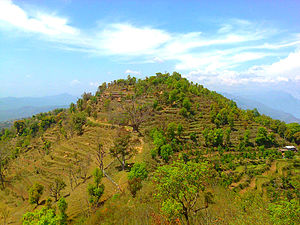Mirkot
Mirkot Gorkha
मिरकोट गोरखा | |
|---|---|
 A hilly view of Mirkot. | |
| Coordinates: 28°0′0″N 84°38′0″E / 28.00000°N 84.63333°E | |
| Country | |
| Region | Western |
| District | Gorkha District |
| Population (2011)A populated Place Of Gorkha District. | |
| • Total | 5,261 |
| Male 2407 & Female 2854 | |
| Time zone | UTC+5:45 (Nepal Time) |
| Postal code | 34000 D.P.O. |
| Area code | 064 |
| मिरकोट | Mirkot |
| Website | www.hamrogorkha.com |
| You can log on or subscribe on facebook.com/mirkotvdc | |
Mirkot ( मिरकोट ) is a village development committee in Gorkha District in the Gandaki Zone of northern-central Nepal. It lies on the western side of the headquarters of Gorkha. According to the National Population and Housing Census 2011, it had a population of 5261 (2407 male and 2854 female), and had 1388 households in the village. Its neighbourhood VDCs are Gaikhur, Dhuwakot, Khoplang, Chyangli, Palumtar, Chhoprak and Deurali. Such as Kotgadi, Lakang, Mahadev Temple are the most important places of Mirkot. The central part of Mirkot VDC is called Bagdanda, Where the main office of the VDC and Mirkot Higher Secondary School are located.[1]
•Major villages: Bagdanda, Sanabesi, Sera, Dhaukhola, Supare, Ramche, Kusuntar, Panthini, Lakang, Britti, Moho Riya, Jhahare, Simalgaira, Lajikot, Dharapani, Jogi Dihi, Tari etc.
•Major Places of Attractions: Such as Kotgadi, Lakang Kalika, Mahadev Temple, Historical Pond of Lazikot are the most Important historical places of Mirkot.
•Ethnic Group: People are mainly from Brahmin, Chhetri, Gurung, Dalit, Magar, Lama, Tamang and other community.
Gallery
-
Kotgadhi.
-
Mirkot Village View.
-
A Village of Mirkot VDC.
-
Mirkot School.
-
Mahadev Temple, Mirkot.
-
Lakang Kalika
References
- ^ "National Population and Housing Census 2011". Nepal's Village Development Committees. Digital Himalaya. Archived from the original on 12 October 2008. Retrieved 2011-08-31.
{{cite web}}: Unknown parameter|deadurl=ignored (|url-status=suggested) (help)
See also








